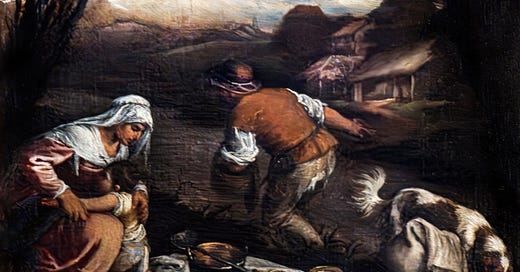Ed note: I got mixed up on what day today is! The first reading and psalm are from Thursday, but the Gospel is correct.
Today, Jesus gives us one of His longer parables. He explains it to the apostles, but not the crowds. Why? It’s not time, yet. Not everyone was ready to hear the full meaning, like the apostles were. Jesus reveals Himself to us when we’re ready.
Reading 1
Heb 10:19-25
Brothers and sisters: Since through the Blood of Jesus we have confidence of entrance into the sanctuary by the new and living way he opened for us through the veil, that is, his flesh, and since we have “a great priest over the house of God,” let us approach with a sincere heart and in absolute trust, with our hearts sprinkled clean from an evil conscience and our bodies washed in pure water. Let us hold unwaveringly to our confession that gives us hope, for he who made the promise is trustworthy. We must consider how to rouse one another to love and good works. We should not stay away from our assembly, as is the custom of some, but encourage one another, and this all the more as you see the day drawing near.
In ancient times, Israelites could only approach God with the temple veil as a shield between them. The feared seeing God face-to-face would destroy them. Here, Paul tells us that Jesus has opened the veil with his own body, dying for our sins and allowing us to be saved. We shouldn’t be afraid of God, because Jesus told us we could have hope in His sacrifice.
Responsorial Psalm
Ps 24:1-2, 3-4ab, 5-6
R. (see 6) Lord, this is the people that longs to see your face.
The LORD’s are the earth and its fullness;
the world and those who dwell in it.
For he founded it upon the seas
and established it upon the rivers.
R. Lord, this is the people that longs to see your face.
Who can ascend the mountain of the LORD?
or who may stand in his holy place?
He whose hands are sinless, whose heart is clean,
who desires not what is vain.
R. Lord, this is the people that longs to see your face.
He shall receive a blessing from the LORD,
a reward from God his savior.
Such is the race that seeks for him,
that seeks the face of the God of Jacob.
R. Lord, this is the people that longs to see your face.
We can’t approach God on our own. It’s impossible for all human beings—except one, Jesus Christ. He can stand in the holy place, and bring us along with Him.
Alleluia
R. Alleluia, alleluia.
The seed is the word of God, Christ is the sower;
all who come to him will live forever.
R. Alleluia, alleluia.
I still think it’s strange to say that Christ is both the Word and, in this parable, also the sower.
Gospel
Mk 4:1-20
On another occasion, Jesus began to teach by the sea. A very large crowd gathered around him so that he got into a boat on the sea and sat down. And the whole crowd was beside the sea on land. And he taught them at length in parables, and in the course of his instruction he said to them, "Hear this! A sower went out to sow. And as he sowed, some seed fell on the path, and the birds came and ate it up. Other seed fell on rocky ground where it had little soil. It sprang up at once because the soil was not deep. And when the sun rose, it was scorched and it withered for lack of roots. Some seed fell among thorns, and the thorns grew up and choked it and it produced no grain. And some seed fell on rich soil and produced fruit. It came up and grew and yielded thirty, sixty, and a hundredfold."
He added, "Whoever has ears to hear ought to hear."
And when he was alone, those present along with the Twelve questioned him about the parables. He answered them, "The mystery of the Kingdom of God has been granted to you. But to those outside everything comes in parables, so that they may look and see but not perceive, and hear and listen but not understand, in order that they may not be converted and be forgiven."
Jesus said to them, "Do you not understand this parable? Then how will you understand any of the parables? The sower sows the word. These are the ones on the path where the word is sown. As soon as they hear, Satan comes at once and takes away the word sown in them. And these are the ones sown on rocky ground who, when they hear the word, receive it at once with joy. But they have no roots; they last only for a time. Then when tribulation or persecution comes because of the word, they quickly fall away. Those sown among thorns are another sort. They are the people who hear the word, but worldly anxiety, the lure of riches, and the craving for other things intrude and choke the word, and it bears no fruit. But those sown on rich soil are the ones who hear the word and accept it and bear fruit thirty and sixty and a hundredfold."
Jesus doesn’t speak in parables to obscure the truth. He’s trying to teach everyone at a level they can understand. Not everyone looks for deeper meanings in a story, but they still receive the lessons at some level.
Others require more explicit explanations. Jesus lays the parable bare to the Apostles, so that there’s no confusion, and so that they can pass their knowledge on to future generations. You know, us.




